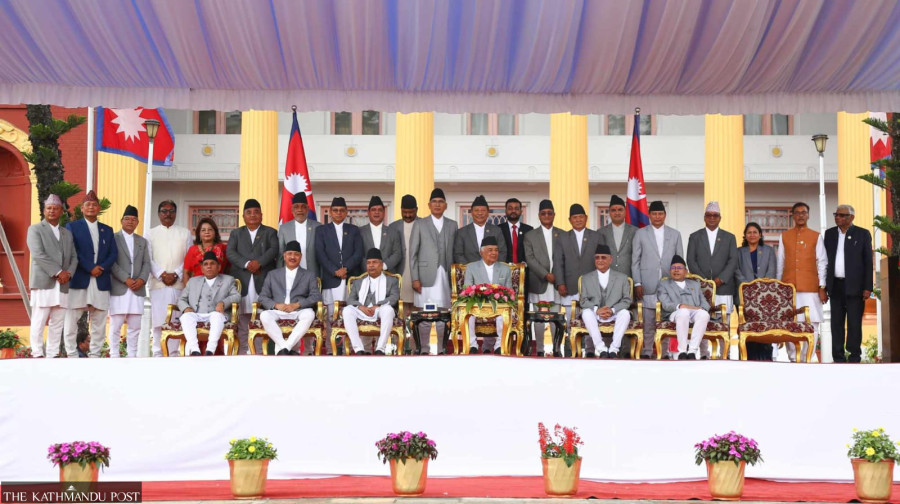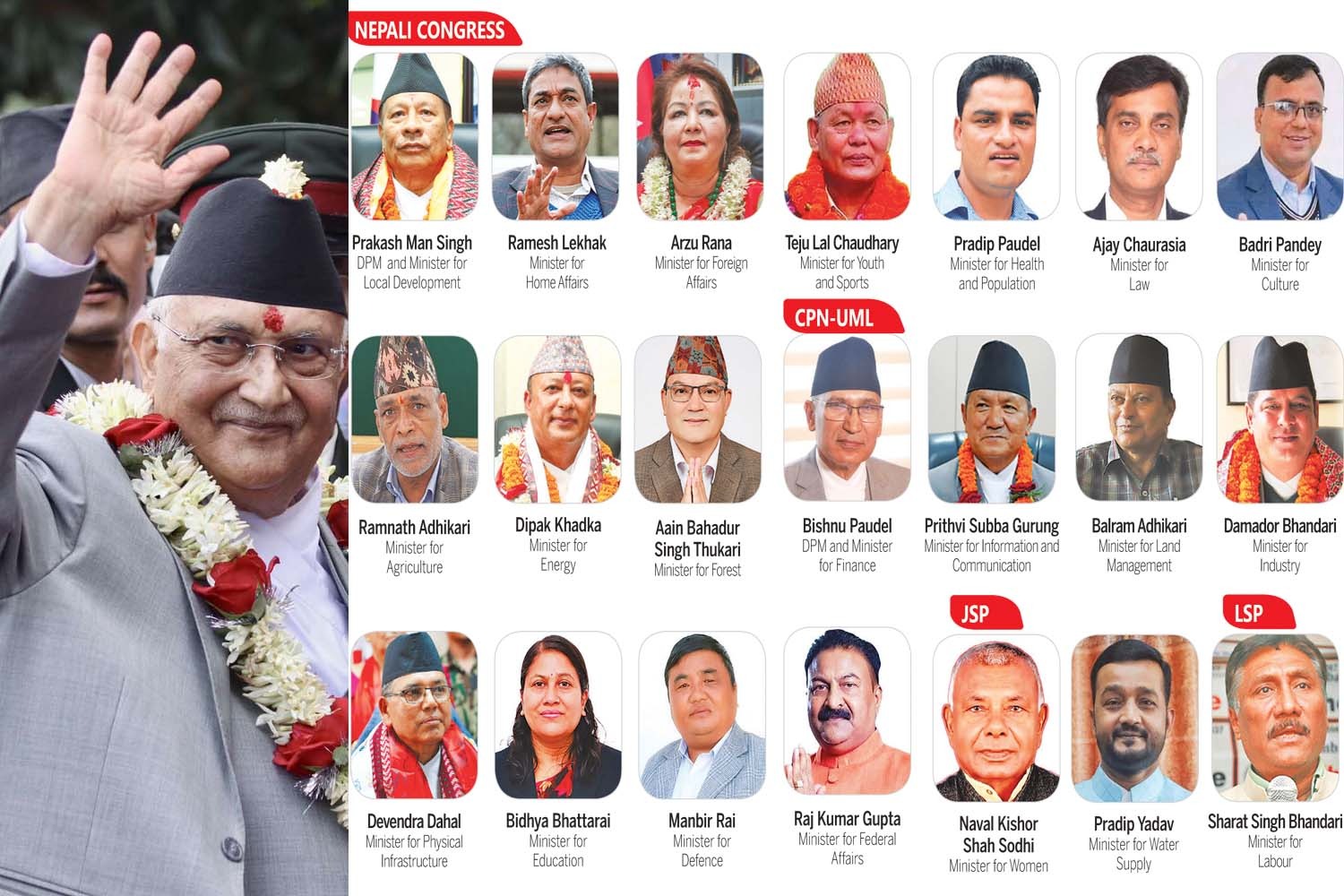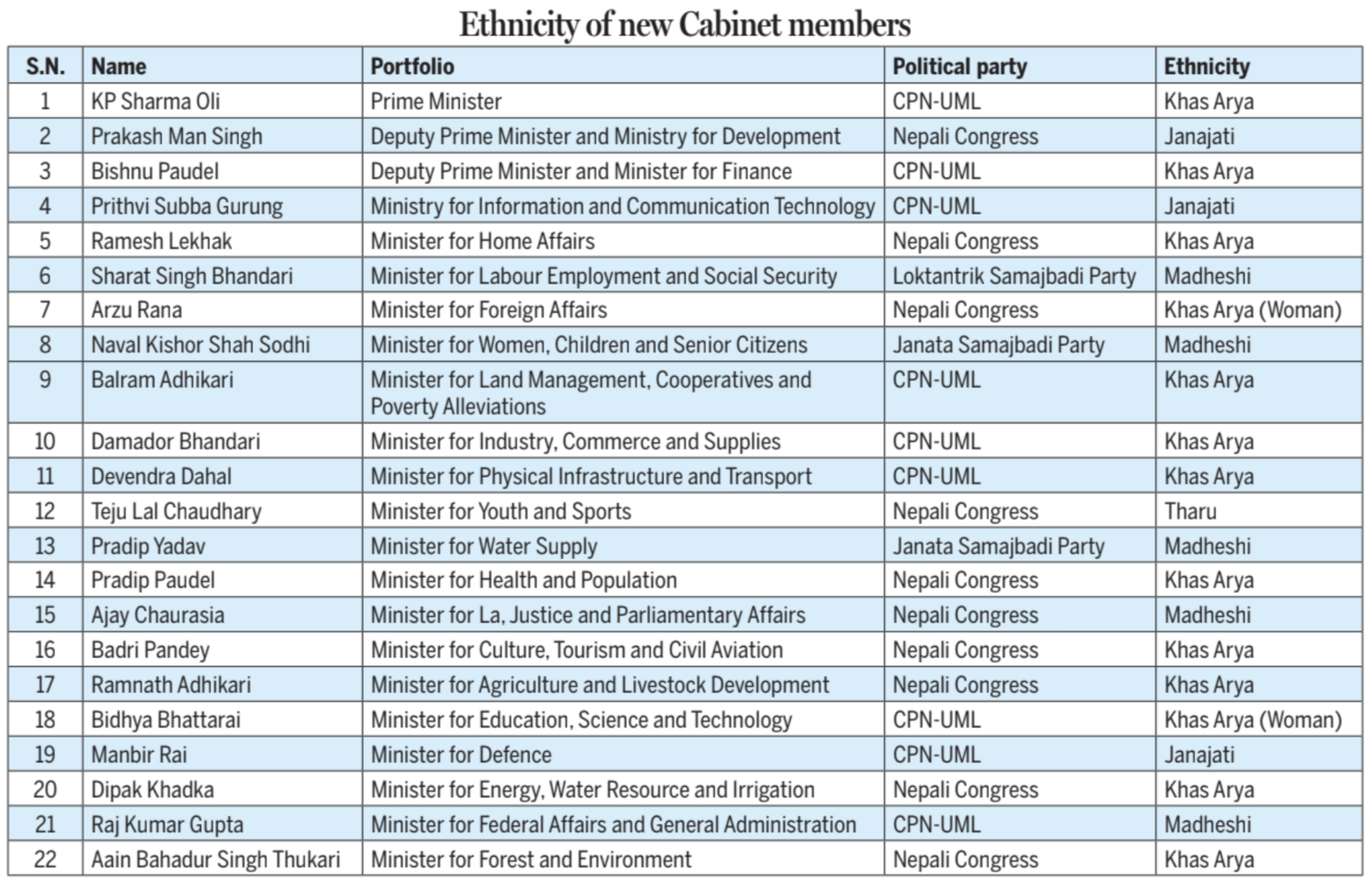Politics
President swears in a 22-member Cabinet of Ministers
The new Cabinet has been criticised for lack of inclusion, with just two women, five Madhesis and no Muslim representation.
Purushottam Poudel
CPN-UML chair KP Sharma Oli was sworn in as the prime minister of Nepal for the fourth time amid a function at the President’s Office in Sheetal Niwas on Monday.
President Ramchandra Paudel administered the oath of office and secrecy to Prime Minister Oli. President Paudel on Sunday had appointed Oli as the prime minister under Article 76 (2) of the constitution as there were no other claimants for the post.
After CPN (Maoist Centre) chair Pushpa Kamal Dahal, the immediate past prime minister, was unable to secure the trust of the House of Representatives during a floor test on Friday, President Paudel had invited political parties to form a new government under Article 76 (2) of the constitution on the same evening, setting a Sunday deadline for submitting claims at the President’s Office.
With no other contender, Oli had in his support submitted the signatures of 166 lawmakers (Nepali Congress’ 88 and UML’s 78). The minimum number needed to form a government is 138 in the 275-strong House of Representatives.
Soon after the swearing-in ceremony on Monday, Prime Minister Oli formed a full 22-member Cabinet, including two deputy prime ministers. Among the 22 members including the prime minister, 10 are from the Congress, while nine represent the UML. The other parties in the Cabinet are the Janata Samajabadi Party (JSP), led by Ashok Rai, and Loktantrik Samajbadi Party (LSP), which have two and one ministries, respectively.

Shortly after Oli’s swearing-in, President Paudel also administered the oath of office and secrecy to the newly appointed ministers. Based on Article 76 (9) of the constitution, President Paudel, on the recommendation of the prime minister, administered the oath of office and secrecy to the ministers.
Article 76 (9) stipulates that the President shall, on the recommendation of the prime minister, constitute the Council of Ministers comprising a maximum of 25 ministers, including the prime minister, in accordance with the inclusive principle from among the members of federal Parliament.
Despite the Article based on which the prime minister recommended the ministers clearly stating that the council of ministers should be in line with the inclusive principle, that is not the case.
In the 25-member council of ministers, Prime Minister Oli can still appoint three ministers.
“The prime minister still can appoint three full Cabinet ministers or ministers of state to fulfil the requirement enshrined by the constitution for the council of ministers,” Purnaman Shakya, a professor of constitutional law, told the Post. “But ministers of state can only participate in Cabinet meetings in the absence of their line ministers.”
In Monday’s Cabinet, Prakash Man Singh of the Congress and Bishnu Prasad Paudel of the UML were inducted as deputy prime ministers. They will also head the Ministry of Urban Development and the Ministry of Finance, respectively.
In the 22-member Cabinet formed under Oli’s leadership, there are only two women. There is no representation from the Dalit and Muslim communities.
In the 22-member Cabinet, 13 are from the Khas Arya community, and there are three members from Janajati and five from Madheshi communities.
Nepal has incorporated proportional representation and inclusion as integral parts of the constitution. This was done to prevent the overrepresentation of one community at the policy-making level. But the country has failed to abide by its charter.
“What an irony! Not a single Dalit get a berth in the new Cabinet formed by the so-called champions of inclusive democracy,” Lokraj Baral, a professor of political science, wrote on social media.
Likewise, Bhimarjun Acharya, a constitutional expert, also questioned the new Cabinet's inclusiveness.
“Everyone did a lot of politics in the name of Dalits, and the communists even more so. Dalits were not given any place in yesterday’s government led by Pushpa Kamal Dahal nor in today’s government led by Oli,” Acharya wrote on social media. “I request that Dalits be represented in the Council of Ministers immediately.”

When the Post questioned Dalit members of the Congress and the UML parties, they said they were not the right people to comment on the issue.
As per the National Population and Housing Census 2021, 13.2 percent of the national population are Dalits while Muslims comprise 4.86 percent of the population.
Yet Dalit activists find fault with this silent approach. It is precisely because the Dalit politicians do not strongly raise the issue of their inclusion that this trend prevails, they say.
“There are a few other reasons why Dalits are sidelined from mainstream politics. One is because of a weakened Dalit movement,” Purna Darnal, a Dalit activist, told the Post. “When the Maoist Centre, a political party that championed inclusiveness in Nepali politics, refused to be inclusive in the Cabinet formed in their leadership, why would other parties do so?”
Darnal added that it is a matter of shame that the two biggest parties in the country practice such blatant exclusion while choosing ministers.
Nine of the 10 ministers from the Congress are male. When dividing them into clusters, seven are Khas Arya, and one each are Janajati, Tharu and Madheshi.
Likewise, eight of the nine ministers of UML are male. Six are from the Khas Arya community, two are Janajati, and one is a Madheshi.




 18.12°C Kathmandu
18.12°C Kathmandu















